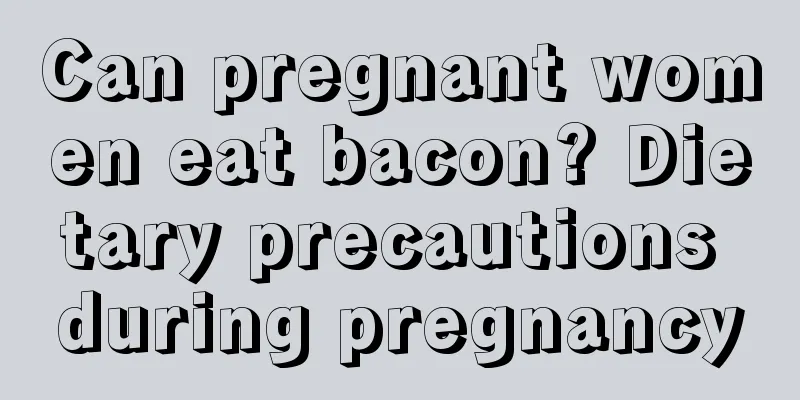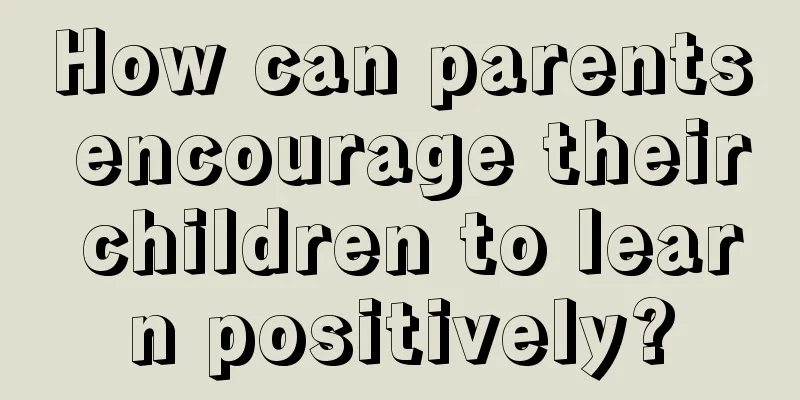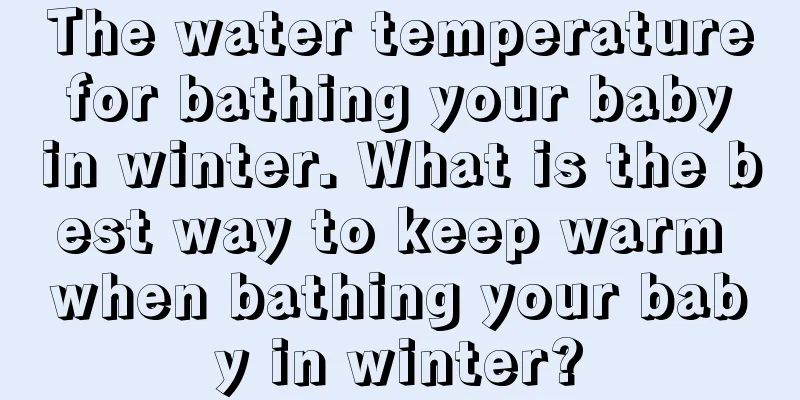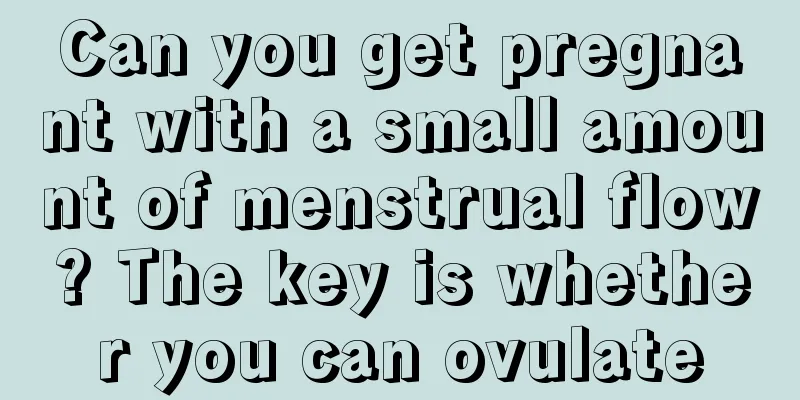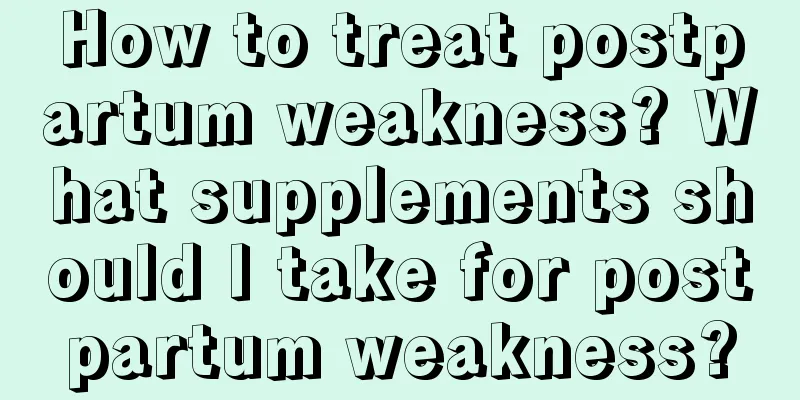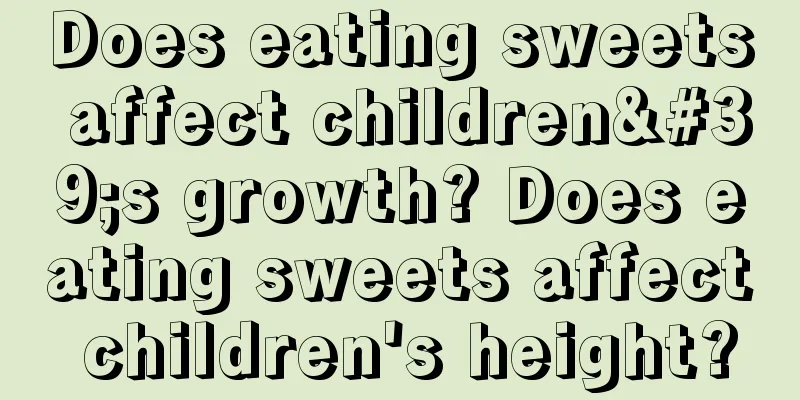What are the symptoms of baby convulsions? How to distinguish between baby convulsions and shocks?
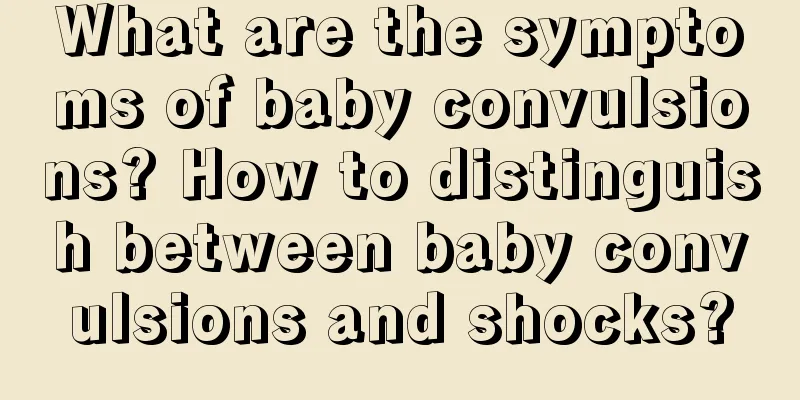
|
Newborn babies are still in the process of slowly adapting to the world, and it is inevitable that they will experience various discomforts during this process. So what are the symptoms of baby convulsions? How to distinguish between baby convulsions and startle? How to deal with a newborn baby being frightened or startledThe reaction before a startle or jump If a newborn baby is about to fall asleep or has no intention of sleeping, his body will shake rapidly after hearing a loud noise. If a baby wakes up from sleep, opens his eyes, and his body twitches or trembles unconsciously, sometimes he cries, and even stretches his limbs unconsciously, as if he is having a nightmare. These situations are called startle reactions, but this reaction is also a normal physiological reaction. Newborn babies have a strong sense of self-protection, and these reactions can prevent various injuries or fight back to protect themselves. Sometimes adults also have this reaction when they are frightened, but it is not so obvious. Factors that cause a startle or jump shock Newborn babies can hear sounds, but when the surrounding sounds are transmitted from the auditory nerve to the brain nerve center, the nervous system is stimulated and the limbs are controlled, which causes various reactions. This is because the cerebral cortex function of newborn babies is not fully developed. As the baby grows day by day, the nervous system will gradually develop and the stimulation from the surrounding will gradually disappear. What should we pay attention to when we have "startle" symptoms? If your baby is over six months old and still often gets startled or startled, there may be something wrong with the baby's brain and nervous system. The startle or startle response is not proportional, that is, if one arm does not respond, it may cause problems with the hand, which is a common "brachial plexus injury" and some may cause clavicle fractures; The startle or startle reaction is short-lived and may disappear immediately or within a few seconds. If the limbs continue to tremble, seek medical attention immediately. Correctly distinguish between neonatal startle and convulsionMany careful parents will find that the hands and feet of newborn babies often shake involuntarily. This is more common when changing clothes or taking a bath. They often startle when sleeping, with their hands open upwards and then quickly retracted, and sometimes they cry. Some parents are very nervous. Is the baby too timid or sick? Will it affect the intellectual development in the future? Let us introduce how to distinguish between startle and convulsion. The above phenomenon is a normal "startle" phenomenon, which generally does not require any special treatment and will not have any adverse effects on the baby's future. Parents do not need to be nervous. The "startle" phenomenon is due to the incomplete development of the newborn's nervous system, and the excitement caused by stimulation is easy to "generalize". It manifests as the baby shaking when the newborn's blanket is opened or loud noises, strong light, vibrations, and changes in his/her body position, with spontaneous movements like forehead shaking, or slow, irregular, twitching movements of the hands and feet. Sometimes even shaking of the feet, knees, and lower collar can be seen, which are unconscious and uncoordinated movements. This is a normal phenomenon and will not affect intellectual development. As the age increases and the brain develops continuously, this involuntary shaking will gradually decrease, and will slowly disappear after two or four months, and will be replaced by conscious and autonomous movements. When a newborn baby starts to startle, an adult can calm him/her down by gently pressing any part of his/her body. If a newborn baby is not wrapped in a blanket, you can calm him/her down by holding his/her shoulders or holding him/her in your arms. However, the startle of a newborn still needs to be distinguished from the jump. If after opening the swaddle, the baby is found to be staring, squinting, blinking, chewing and sucking repeatedly, breathing irregularly with cyanosis of the skin, twitching of facial muscles, or sudden changes in muscle tone, such as persistent rigidity of the limbs, or repeated rapid twitching of a limb or part of the body and paroxysmal spasms, these are all manifestations of neonatal convulsions. Convulsions have a certain impact on the future brain development of newborns and may cause neurological sequelae. Therefore, if you find that your baby has a startle or you are not sure whether it is a startle, you should ask a doctor to diagnose it in time, find the cause and give treatment. The difference between baby startle and convulsionLiangliang is one month old, with a chubby face, and is regarded as the apple of the family's eye. However, his abnormal behavior in recent days has disrupted the family's joy and laughter. Because every time Liangliang's clothes are changed or there is a loud noise outside, the baby's hands and feet will shake involuntarily, and even the chin or the whole body will shake rapidly. However, the baby's eating, sleeping, and playing are not affected at all, and the parents took Liangliang to see doctors everywhere. Yuanyuan, 4 months old, has been very quiet since birth. Grandpa and grandma think she is a good grandson who is not naughty. Especially recently, she has shown some abnormal behaviors, which they think are normal. The baby always nods, bends, raises legs and hands when waking up. The movements are very fast, but they will repeat more than ten times one after another. The same behavior has been present for several days. The young parents feel something is wrong and ask to take the baby to the hospital for treatment, but the grandparents and other elders disagree, thinking that the baby is growing up slowly, and it is normal to have some naughty movements after waking up. Startle is not a convulsion. Just as Liangliang showed, startle is a large-amplitude, high-frequency, rhythmic limb shaking or clonic movement, which can be eliminated by passive flexion of the limbs or changing body position, and is not accompanied by eye or mouth movement. When the baby startsle, parents do not need to be overly nervous. Sometimes you can calm the baby down by gently pressing a part of the baby's body. Infant startle is a very common phenomenon and will not affect the baby's brain development. But be careful. If the baby has frequent and excessive startle reactions or still has large and rapid startle reactions after the age of four months, go to the hospital as soon as possible to be alert to the possibility of neurological diseases. Convulsion, also called convulsion, is a common acute symptom in children, especially in children under 3 years old. It is caused by a variety of reasons that cause brain nerve dysfunction, manifested as sudden systemic or local muscle group tonic and clonic convulsions, often accompanied by impaired consciousness. The duration of convulsions ranges from a few seconds to a few minutes each time, and sometimes even a continuous state of convulsion occurs. If it lasts too long or recurs repeatedly, it will affect the brain development of children. Therefore, when pediatric convulsions occur, they should be treated actively, such as Yuanyuan mentioned above. So, what are the causes of pediatric convulsions? They can usually be divided into infectious and non-infectious. The most common representative diseases in infants are febrile convulsions, hypocalcemic convulsions, epilepsy, etc. When a child has a convulsion, parents should go to the hospital to see a pediatric neurologist to find out the cause as soon as possible, and do not delay the condition. Therefore, we should understand that childhood startle and convulsion are two different things. Startle is not a disease but a normal physiological phenomenon. Parents do not need to be overly nervous. Convulsion needs to be handled and treated in a timely manner. Parents need to take an active approach and not delay. Mothers must pay attention to various subtle reactions in their baby's life, carefully understand what symptoms their baby has, and seek medical attention in time when necessary. |
<<: Is it good to get pregnant in autumn? What are the precautions for getting pregnant in autumn?
Recommend
The child coughed and vomited. What is the reason for the child's cough and vomiting?
Children are usually very susceptible to illness,...
Can alcohol wipes be used to wipe the face? Can alcohol wipes be used to wipe wounds?
Alcohol wipes are a type of wet wipes that are co...
How to choose a unisex nickname for a baby born in the Year of the Rat Recommended unisex nicknames for babies born in the Year of the Rat
It is particularly important for a baby to have a...
Is it good to drink Shenghua Tang after childbirth? The effect of drinking Shenghua Tang after childbirth
During the postpartum confinement period, because...
Why is it that one eye is bigger than the other? Be alert to these four possibilities
Eyes are the most important organ in the human bo...
What are the symptoms of pregnant women a few days before delivery? What should they eat to make it easier to give birth?
Pregnant women are about to give birth in a few d...
What is Sudden Infant Death Syndrome? What mistakes do babies often make when sleeping?
The baby's body is very fragile, which requir...
Benefits of breastfeeding for babies Benefits of breastfeeding for mothers
We all know that breastfeeding has many benefits ...
What complementary foods are good for babies with diarrhea? Can babies with diarrhea still eat complementary foods?
What complementary food is good for babies with d...
Postpartum mother’s self-narration: What is it like to give birth in water?
Water birth is a new type of birthing method, whi...
Can pregnant women eat pinto beans? What are the benefits of eating pinto beans for pregnant women?
Pinto beans are a food ingredient with high nutri...
What should I do if my child is introverted? What are some books on cultivating children's personality?
In the process of children's growth, their in...
How to deal with baby crying at night? Methods to improve night crying
The first is to create a comfortable sleeping env...
Can I have an abortion if I am pregnant and infected with Zika virus? Is it reasonable to wait 2 years before getting pregnant?
Recently, Brazil is worried that the Zika virus w...
How is Deyun milk powder? Which is better, full-fat or skim milk powder?
I believe many mothers have heard of Deyun milk p...
